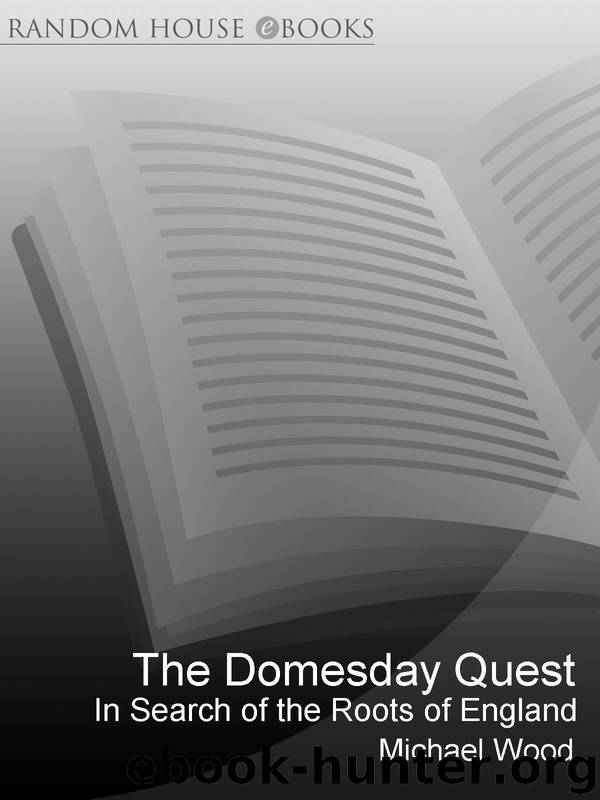The Domesday Quest by Michael Wood

Author:Michael Wood [Michael Wood]
Language: eng
Format: epub
Publisher: Random House
Published: 2005-06-01T16:00:00+00:00
10
MONEY AND TAX: THE OLD ENGLISH COINAGE
NINE HUNDRED YEARS on from Domesday we take money for granted; indeed we are on the threshold of moving away from metal and paper money to electronic systems and computerised shopping and banking. It is likely that by the time the thousandth anniversary of Domesday arrives money will no longer be used in England. But for 1300 years metal coinage has been in continuous use, and until the reforms of the early 1970s the original Anglo-Saxon monetary system of pounds, shillings and pence, with 12 pence to the shilling and 240 pence to the pound, persisted with no basic alterations; it was not long before that the subdivision of the penny into halfpennies and farthings had come to an end. That system was a clever and complex one, and, as will be seen, was important in the context of Domesday.
The earliest proper penny coinage started in the time of King Offa of Mercia (757–96) was issued from Canterbury. Later London, Rochester, an East Anglian mint and perhaps Winchester were added. No other mints are identifiable until the time of Alfred the Great (871-99), when the names of Gloucester, Exeter and Lincoln appear. Alfred’s son, Edward the Elder, seems to have greatly expanded this system, for although the only named mint seems to be Bath, comparison with his son Athelstan’s coins suggests that in Edward’s day mints existed at London, Winchester, Canterbury, possibly Oxford, Shaftesbury, Southampton, Wallingford, Wareham, Chichester, Langport, Lymne; several Mercian towns, including possibly Nottingham, Derby and Tamworth, certainly Chester (in large numbers), Shrewsbury, Stafford and Hereford; and several other unplaced mints. Clearly this great increase in the number of moneyers can be connected with Edward’s reconquest of the Danelaw, and shows that as soon as English control was established in boroughs like Nottingham minting was begun in the king’s name. In some cases this can be dated quite closely to the last five years of the reign.
So when Athelstan succeeded his father in 925 important moves had already been made to provide the expanded burghal system with coinage. The motives behind this become clear with the numerous law codes which survive from Athelstan’s time. None of them can be precisely dated, but as the early years of the reign were taken up with dynastic crisis and then warfare in many parts of Britain, it is reasonable to think that the first main code cannot date from earlier than 928–30. In terms of the history of tax and money in England, this, the Grateley code, is highly significant:
There is to be one coinage over all the king’s dominions, and no one is to mint money except in a town. And if a moneyer is convicted [of forgery], the hand with which he committed the crime is to be struck off and put up over the mint. . . . In Canterbury there are to be seven moneyers; four of the king, two of the bishop, one of the abbot; in Rochester three, two
Download
This site does not store any files on its server. We only index and link to content provided by other sites. Please contact the content providers to delete copyright contents if any and email us, we'll remove relevant links or contents immediately.
| Africa | Americas |
| Arctic & Antarctica | Asia |
| Australia & Oceania | Europe |
| Middle East | Russia |
| United States | World |
| Ancient Civilizations | Military |
| Historical Study & Educational Resources |
Elizabeth by Philippa Jones(2200)
Mary Boleyn by Alison Weir(1883)
Traitors of the Tower by Alison Weir(1631)
A Journal of the Plague Year (Oxford World's Classics) by Daniel Defoe(1523)
Notes From a Small Island by Bill Bryson(1389)
Life of Pi by Yann Martel(1368)
A Short History of England by Simon Jenkins(1325)
Queen Isabella by Alison Weir(1311)
Moon Tiger by Penelope Lively(1268)
Eleanor of Aquitaine by Marion Meade(1267)
The Real Middle Earth by Brian Bates(1241)
London Under by Peter Ackroyd(1234)
American Idol by Richard Rushfield(1138)
Her Majesty's Spymaster by Stephen Budiansky(1083)
Tudors Versus Stewarts by Linda Porter(1082)
Albion by Peter Ackroyd(1067)
The Creation of Anne Boleyn by Susan Bordo(1066)
Cromwell, Our Chief Of Men by Fraser Antonia(1032)
Children Of England: The Heirs of King Henry VIII 1547-1558 by Weir Alison(996)
